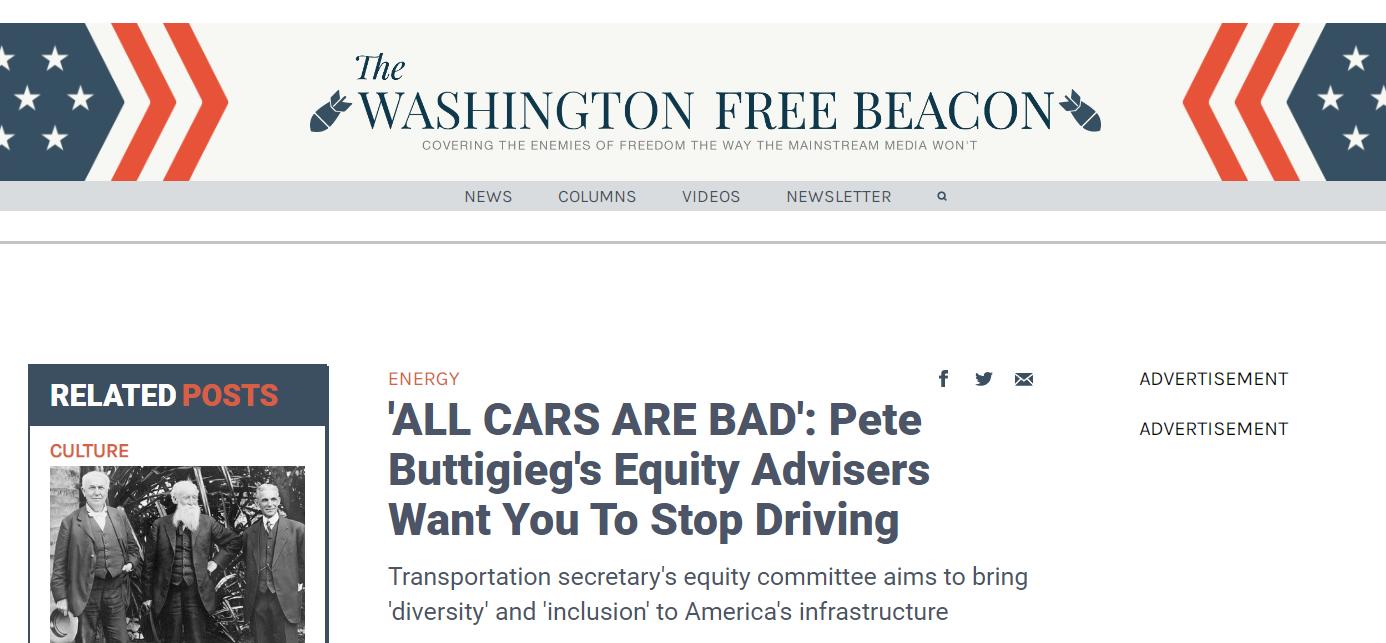
via freebeacon:
“Transportation Secretary Pete Buttigieg is appointing a group of “leading experts” to advise him on “transportation equity,” including several who argue that cars cause climate change and promote racism and therefore should be phased out.
Buttigieg earlier this month appointed 24 new members to his Advisory Committee on Transportation Equity, an Obama-era body that Buttigieg is reviving after the Trump administration scrapped it. Included on the committee is Andrea Marpillero-Colomina, a “spatial policy scholar” who says “ALL CARS ARE BAD” given that they cause “a myriad of environmental issues and conditions.” Another Buttigieg appointee, self-described “transportation nerd” Veronica Davis, argued in an August essay that cars perpetuate “systemic racism” and are therefore “the problem” in America’s transportation system.
Buttigieg’s appointments—and his decision to revive the equity advisory committee—reflect the Biden administration’s whole-of-government emphasis on diversity, equity, and inclusion. President Joe Biden shortly after taking office in 2021 issued an executive order that called on federal agencies to “pursue a comprehensive approach to advancing equity for all.” Under the order, agency heads must conduct an “equity assessment” to identify policies that create “systemic barriers” in minority communities.
The committee will advise Buttigieg on “promising practices to institutionalize equity into agency programs, policies, regulations, and activities” and plans to meet for the first time this fall, according to Buttigieg’s August announcement. Marpillero-Colomina told the Washington Free Beacon that she is not “advocating for a complete erasure” of cars but intends to push Buttigieg to move America away from its reliance on private motor vehicles.”
When It Comes To Transportation Problems, All Roads Lead Back To Cars
“This isn’t anti-car propaganda but vehicles have wreaked havoc on the environment and communities.
On April 27, 1996, I got my first driver’s license. It is a milestone date in my life I will always remember. In my 17-year-old brain (do not do the math), it was my ticket to true independence. For my mom, it meant not having to figure out how to get me to my sports practices or dance classes after a long day of work. One month after I got my license, my dad bought me my first car, which was a 1996 Dodge Neon because he saw the ad that said “Hi.” I will admit, the car did look like it was smiling. The Neon and I had many adventures and misadventures, like the time I spun out on the highway because I was driving too fast.
Cars are as American as apple pie. More importantly, they are a symbol of freedom. If I own a car, I can go wherever I want, whenever I want, and as fast as I want, assuming there is no law enforcement around. People in the United States have a love affair with cars. It is part of our culture. Cars are a status symbol. The car you drive allows others to assess what they think is your wealth. It allows people to discern whether you are “one of us” or you are “not from around these parts.” Car company ads market to us a lifestyle.
That, my friends, is the problem. Cars. I am not anti-car, and yes, cars are the problem. Prioritizing cars creates traffic congestion. Whether I love or hate cars, the fact remains that they are not efficient ways to move people. Think about it this way: 50 people driving alone will take up more roadway space than 50 people on a bus, on bicycles, or on the sidewalk. Traffic-related deaths and serious injuries are caused by people driving cars, and the fact is that the existing transportation system is overbuilt, trying to alleviate congestion during commute periods so people can have the freedom to drive to work in their cars by themselves. As a result of this effort to alleviate traffic congestion during commute periods, the near-empty roads during non-peak times enable people to drive at unsafe speeds — thus, fatalities in motor vehicle crashes are a leading cause of death in the United States.”
Check out all the members on this Buttigieg list…
- Anthony Foxx, Professor of Practice, Kennedy School of Government, Harvard University (Chair)
- Stephanie Gidigbi-Jenkins, Partner, North Star Strategies; Vice President, Communities First Infrastructure Alliance (Vice Chair)
- Shoshana Akins, Manager, Public Participation Planning, Delaware Valley Region Planning Commission
- Charles Brown, Founder, Equitable Cities.
- Flora Castillo, President, Pivot Strategies.
- Clarence Daniel-Angapak, Community Development Division Director, Association of Village Council Presidents
- Veronica Davis, Deputy Director, Houston Public Works; Director, Transportation and Drainage Operations, City of Houston
- Destiny (Thomas) Deguzman, Founder and Chief Executive Officer, Thrivance Group
- Yochai Eisenberg, PhD, Assistant Professor, Department of Disability and Human Development, University of Illinois-Chicago
- Icema Gibbs, Vice President of Corporate Social Responsibility and DEI, JetBlue
- Priya Sarathy Jones, Deputy Executive Director, Fines and Fees Justice Center
- Vince Malone, Chief of Staff and Administration, WeGo Public Transit/Nashville MTA
- Andrea Marpillero-Colomina, Sustainable Communities Program Director, GreenLatinos
- Diana Mendes, Corporate President for Infrastructure and Mobility Equity, HNTB
- Roger Millar, Secretary, Washington State Department of Transportation
- Prashanthi Raman, Vice President, Global Government Affairs, Cruise
- Azikiwe Rich, Executive Director of Performance Management, NYC Department of Transportation
- Oliver Sellers-Garcia, Green New Deal Director and Senior Advisor to Mayor Michelle Wu, City of Boston
- Tunya Smith, Director, Office of Civil Rights, North Carolina Department of Transportation
- Camille C. Williams, Director, Social Responsibility, Transportation Diversity Council
- Phil Washington, Chief Executive Officer, Denver International Airport
- Eboni Wimbush, President and Chief Executive Officer, Airport Minority Advisory Council
- Gregory Winfree, Agency Director, Texas A&M University Transportation Institute
- Jing Zhang, Transportation Planner, Morgantown Monongalia Metropolitan Planning Organization